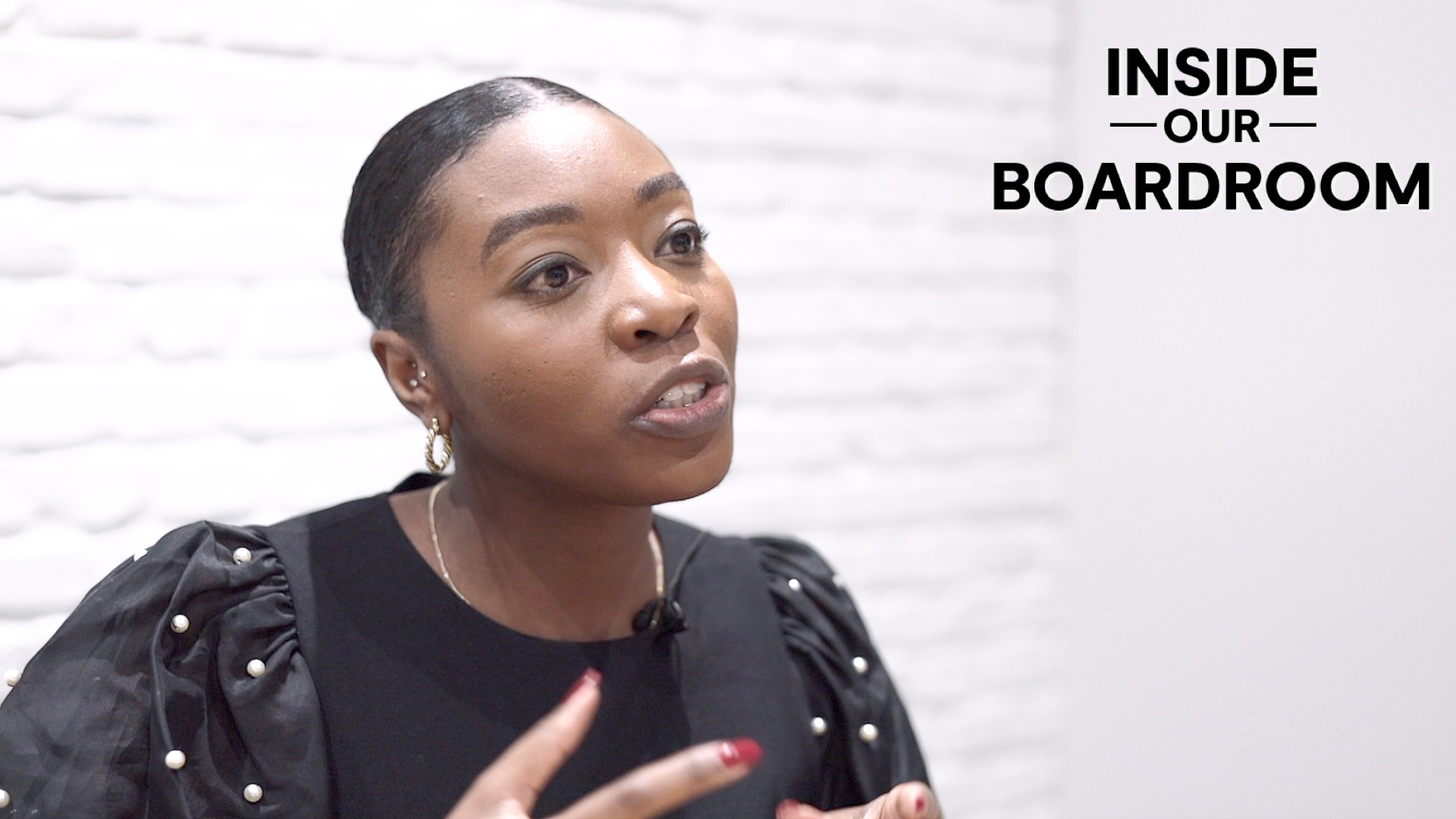An accomplished physician, spoken word poet, and advocate for diversity and inclusion, Dr. Chika Stacy Oriuwa helps audiences build stronger, more productive workplaces. She draws on her medical expertise and leadership background to share her “prescriptions” for success in the future of work — authentic leadership, inclusive work cultures, and mental-health-forward workplaces.
Chika is a medical trailblazer who has spearheaded change in healthcare and beyond. She was named one of Maclean’s 2022 Power 50, one of TIME magazine’s “2021 Next Generational Leaders”, and one of Best Health Magazine’s “2020 Women of the Year”. Mattel honoured her with a one-of-a-kind Barbie doll made in her image to commemorate her contributions as a frontline healthcare worker.
Needless to say, we were very excited when Chika joined us for a chat inside our boardroom. We dove deep into the mechanics of authentic leadership, organizational wellness, building inclusive spaces, and even a little poetry. Enjoy this video Q&A and contact us to learn more about Chika.
Answers have been edited for length and clarity.
Authentic Leadership
Speakers Spotlight: What’s the dynamic between authenticity and effective leadership?
Dr. Chika Stacy Oriuwa: Historically, our understanding of leadership and what it takes to be a good leader was someone who doesn’t show a lot of weaknesses or emotion, someone who is forward in being strong and confident. More recently, especially after the pandemic where a lot of weaknesses and vulnerabilities were exposed individually and collectively, more organizations are into this idea of leading with vulnerability, which lends itself to authenticity.
Leading authentically means that you bring your true self into a space and that means you’re inviting others to do the same. In a world where mental health is now at the forefront of our discussions, it’s so important that we’re able to have leaders who can embrace those “soft skills” and have these vulnerable conversations.
With a master’s degree in health systems leadership and innovation, Chika shows audiences how to become a leader people actually want to follow in her keynote “Authentic Leadership: Your Prescription to Success in the Future of Work”. She expands on authentic leadership in the video below.
Organizational Wellness
SpSp: How can organizations support employee wellness in the long-term?
CO: Often when we think of organizational wellness, we see it as this huge, overwhelming, monumental task. Leaders feel that the onus falls on them and individuals within an organization think their own wellness is solely on them.
In my talks, I shift the conversation away from self-care to taking care of one another. When we’re able to take care of each other, we create these moments of connection — I like to call them micro-moments of connection. Something that can be done quite often, almost everyday if a team needs it, is a relational pause. That’s where you take a break from task work to really check in with one another. Ask someone, “how are you doing today” and instead of expecting them to say “oh, I’m fine,” ask, “no, how are you really doing today?” Dig for that deeper connection to learn how work is affecting them or if there are other things that might be affecting how they’re able to bring themselves into work that day. Most importantly, follow that up with validation and gratitude.
It’s these moments that deepen and tighten the bonds between individuals within a workplace. I like to borrow from my experiences as a psychiatry resident and my background in leadership to impart therapeutic principles that everyday individuals can use, so they are able to create a space that is safe, welcoming, inviting, and inclusive.
In her keynotes, Chika dives deep into the mechanics of wellness and what it looks like on an organizational level. She answers the question of what it means to be well amongst a diverse group of people and shares tools and strategies to help leaders protect and promote mental health across their organization.
Watch the video below to learn more about organizational wellness:
Building Inclusive Workplaces
SpSp: How can leaders identify organizational disconnect in their workplace?
CO: You have to get deeply curious about your workplace environment, and even about yourself as a leader, to identify issues. It takes bold conversations, and in order to lead those conversations you have to be vulnerable enough to recognize that something may be at play.
Leaders must role model these bold conversations at all levels of an organization. That means putting yourself in a position of vulnerability where you’ll have to receive critique and feedback and recognize that it might not always be comfortable. Change rarely happens in places that are comfortable. It requires discomfort, which requires a level of braveness, of feeling bold, and being vulnerable.
So, get deeply curious and lead bold conversations. Then, once you have this database of information, you’ll be able to act upon it and build systems of accountability and responsibility.
Learn more about identifying and fixing organizational and team disconnect in the video below:
SpSp: How can organizations infuse inclusivity in their workplace culture?
CO: Providing prescriptions to the audience is my favourite part of my talks because I leave them with tangible, take home ideas and skills that they can start working on that very day.
For example, I encourage audiences to validate, and provide them with terms and phrases they can use in everyday conversations, like “I’m sorry you went through that experience. That sounds very hard for you.” This helps them feel as though instead of having to take this giant leap into advocacy, they can take a baby step and then continue to build on that baby step. It’s kind of like a muscle that you can flex everyday until it becomes second nature.
I also provide audiences with ways to spot disconnection, moments where they could be creating a gap between themselves and their peers. Oftentimes this comes in the form of invalidation or reflexively invalidating someone, for example by saying, “that doesn’t sound so bad” or “maybe you’re viewing things incorrectly”. These create moments of disconnection. Providing the audience with concrete, takeaway messages and examples that they can employ right away is what enables them to infuse DEI strategies in their workplace culture.
Chika draws on her experiences spearheading DEI initiatives in healthcare to equip audiences with actionable strategies to build equitable workplaces. This includes how to spot and stop subtle discrimination, enact effective anti-racist policies, and become better allies. Learn more in the video below:
The Power of Poetry
SpSp: How does poetry impact your work and life?
CO: Writing poetry, reading poetry, performing poetry is as natural to me as breathing. As soon as I learned how to write I was writing poetry. I’ve been performing poetry since I was in elementary school and did it professionally in my undergrad. I no longer compete but I still love to gig and infuse poetry into my talks whenever I’m able to.
Becoming a better poet has enabled me to become a better doctor. Poetry requires this unflinching examination of the human experience as does being a doctor and especially a psychiatrist — really being able to face some of the darkest and hardest things that individuals go through and sit in those stories with them. Being a poet enabled me to become more connected with my humanity and it’s one of the most important and critical aspects of who I am.
Working under the Hamilton Youth Poets, Chika earned her place as a national slam poetry finalist twice. When requested, she weaves poetry into her keynotes, creating a one-of-a-kind experience for her audiences.
Contact us to learn more about Dr. Chika Stacy Oriuwa and how she helps organizations build inclusive and supportive environments that drive results.




